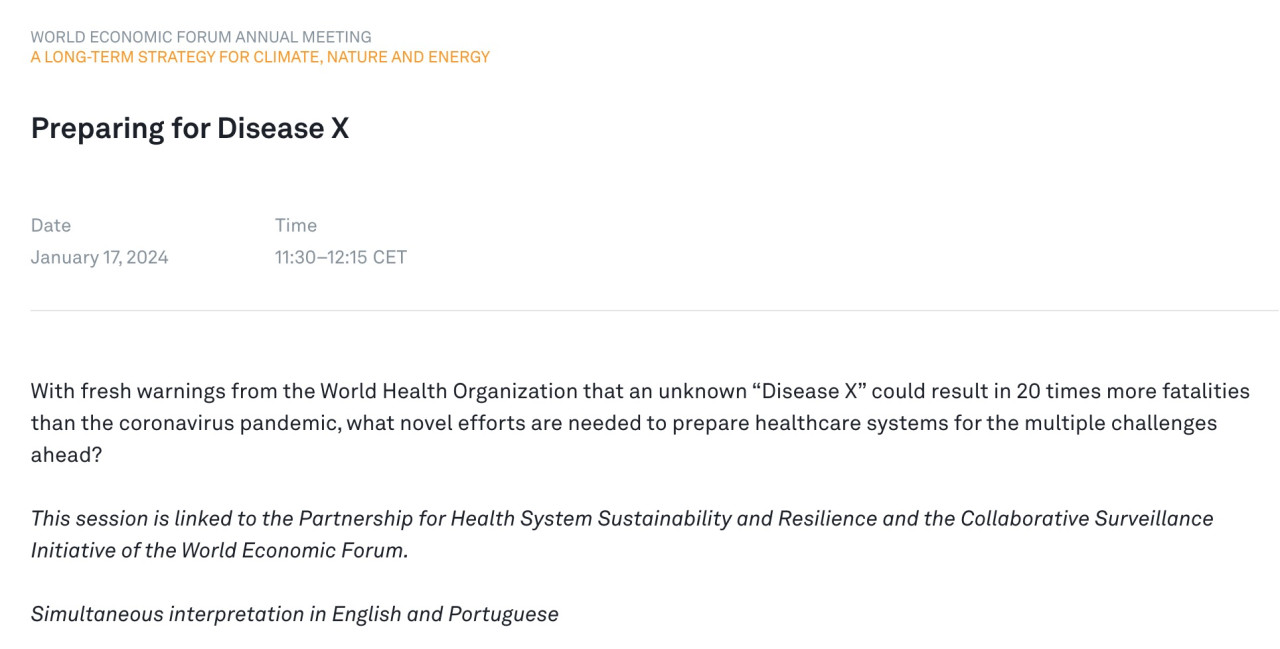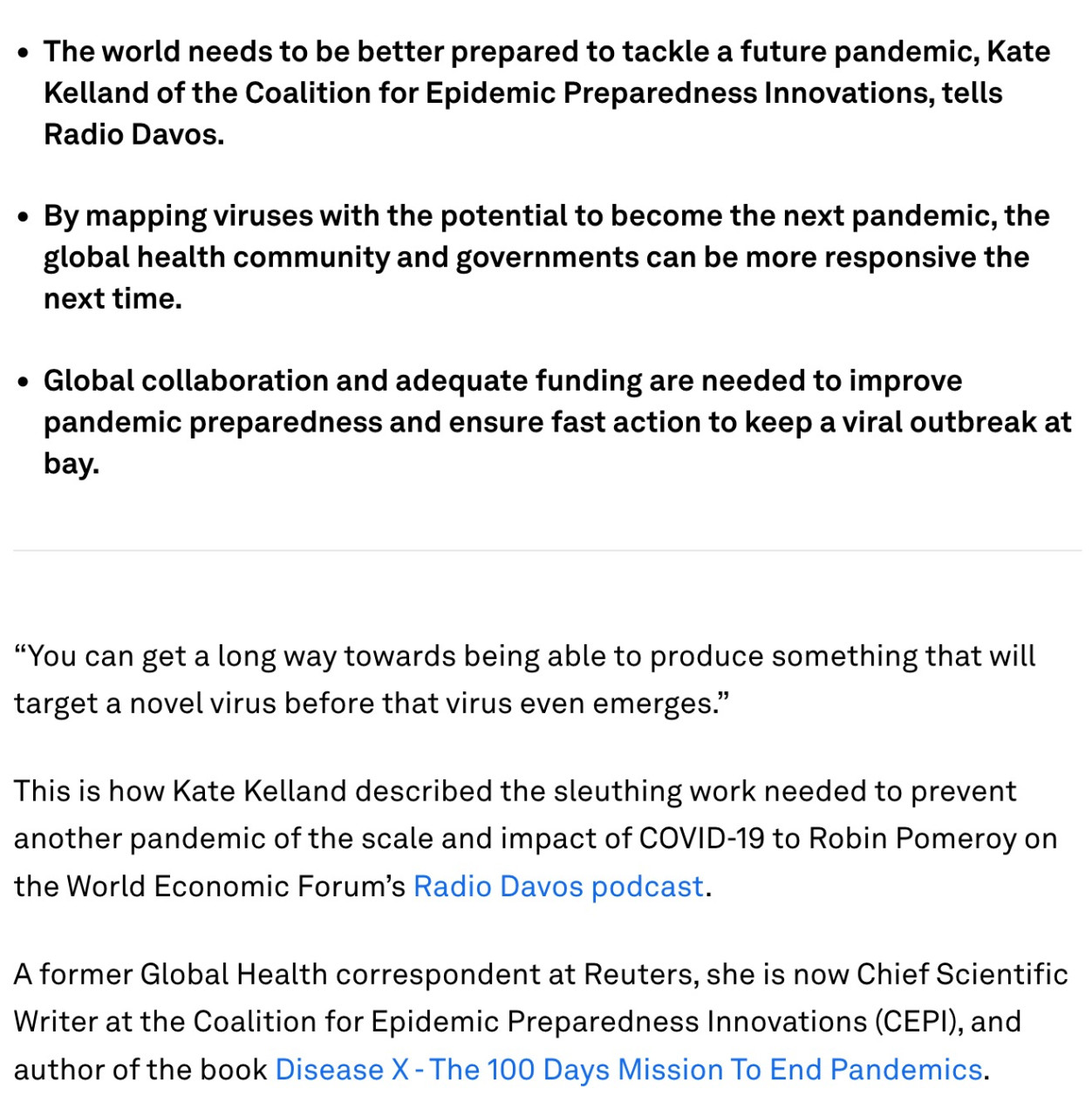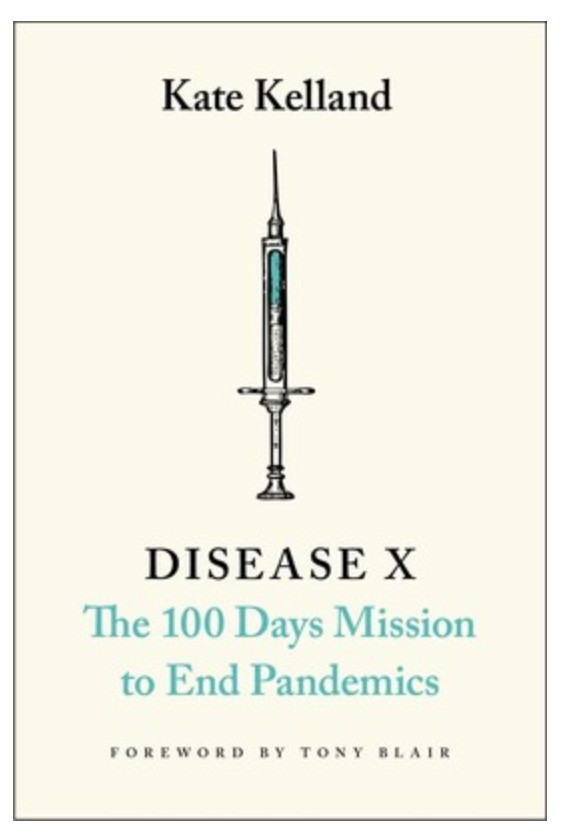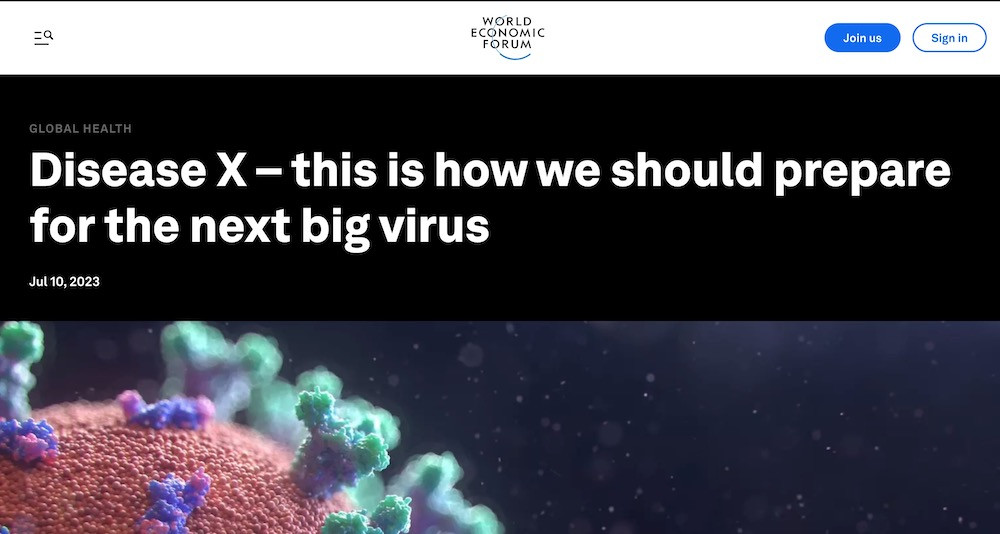Vorbereitung auf die "Krankheit X" - nächste Plandemie
Die neue geplante weltweite Pandemie (Plandemie) scheint festzustehen und die Details ihrer Umsetzung werden wohl am 17. Januar bei der Jahrestagung des Weltwirtschaftsforums (WEF) in Davos ausgeheckt. Wir sind wieder in einem Wahljahr (USA), genauso wie das bei Covid 19 im 2020 war.
Klaus Schwab meldet auf der WEF Website dass die "Krankheit X" 20 Mal mehr Todesopfer als Covid 19 fordern soll:
https://www.weforum.org/agenda/2023/07/diseasex-pandemic-preparedness-cepi/
Die Vorbereitungs-Sitzung auf die Krankheit X am 17. Januar beginnt um 11:30 Uhr und die Rednerliste allein ist schon aussagekräftig genug, um zu erkennen, welches Spiel hier wieder laufen soll. Ein buntes Potpourri aus WHO, WEF und Pharmalobbyisten und natürlich ihrer Propagandamedien:
Dabei hat die Planung bereits im Sommer 2023 begonnen bzw. war man sich einig, dass eine neue "Krankheit X" kommen wird, die 20 Mal tödlicher ist als COVID-19 sein wird und fast 50 Millionen Menschenleben fordern könnte. Der US-Congress hat deshalb am 5. Juni 2023 das Gesetz "H.R. 3832: Disease X Act of 2023" verabschiedet, in dem festgelegt ist, welche medizinischen Gegenmaßnahmen erforderlich sind. Das Weltwirtschaftsforum wird dann wohl nächste Woche in Davos ihre Lakaien aus Politik und Massenmedien anweisen, wie sie es zu einer neuen weltweiten Panik hochpuschen können.
Durch die Kartierung von Viren, die das Potenzial haben, die nächste Pandemie auszulösen, können die globale Gesundheitsgemeinschaft und die Regierungen beim nächsten Mal besser reagieren.
Um die Pandemiebereitschaft zu verbessern und ein schnelles Handeln zu gewährleisten, um einen Virusausbruch einzudämmen, sind eine globale Zusammenarbeit und eine angemessene Finanzierung erforderlich.
"Man kann einen langen Weg zurücklegen, bis man in der Lage ist, etwas zu produzieren, das gegen ein neuartiges Virus wirkt, noch bevor dieses Virus überhaupt auftaucht."
So beschrieb Kate Kelland im Radio Davos-Podcast des Weltwirtschaftsforums gegenüber Robin Pomeroy die Detektivarbeit, die notwendig ist, um eine weitere Pandemie von der Größenordnung und den Auswirkungen von COVID-19 zu verhindern.
Die frühere Korrespondentin für globale Gesundheit bei Reuters ist jetzt wissenschaftliche Chefredakteurin bei der Coalition for Epidemic Preparedness Innovations (CEPI) und Autorin des Buches Disease X - The 100 Days Mission To End Pandemics.
CEPI ist eine gemeinnützige Organisation, die die Erforschung und Entwicklung von Impfstoffen gegen Krankheiten finanziert, die möglicherweise zu Epidemien oder Pandemien werden könnten. Mit dem Weltwirtschaftsforum als einem seiner Gründungsmitglieder hat CEPI die Anschubfinanzierung für drei erfolgreiche COVID-19-Impfstoffe geleistet, darunter die weithin bekannten Impfstoffe von AstraZeneca und Moderna. Die Organisation arbeitet auch an einer Reihe von Krankheiten, die sich als nächste Pandemie ausbreiten könnten.
- The world needs to be better prepared to tackle a future pandemic, Kate Kelland of the Coalition for Epidemic Preparedness Innovations, tells Radio Davos.
- By mapping viruses with the potential to become the next pandemic, the global health community and governments can be more responsive the next time.
- Global collaboration and adequate funding are needed to improve pandemic preparedness and ensure fast action to keep a viral outbreak at bay.
"You can get a long way towards being able to produce something that will target a novel virus before that virus even emerges."
This is how Kate Kelland described the sleuthing work needed to prevent another pandemic of the scale and impact of COVID-19 to Robin Pomeroy on the World Economic Forum's Radio Davos podcast.
A former Global Health correspondent at Reuters, she is now Chief Scientific Writer at the Coalition for Epidemic Preparedness Innovations (CEPI), and author of the book Disease X - The 100 Days Mission To End Pandemics.
CEPI is a non-profit organization that funds research and development of vaccines against diseases that could potentially become epidemics or pandemics. With the World Economic Forum as one of its founding members, CEPI seed-funded three successful COVID-19 vaccines, including the widely known AstraZeneca and Moderna injections. The organization also works on a range of diseases that could become the next pandemic to spread.
Kelland explained: "It's a virus that we don't know yet, but we do know is out there, and we do know has the potential to spill over from an animal population potentially into humans, perhaps mutate or adapt itself and then begin spreading and killing people faster than we can contain it."
"Engaging, accessible and ultimately optimistic account" - BBC Medical Editor Fergus Walsh
"DISEASE X sets out a game-changing plan for how the world can learn from Covid-19 and be ready for the next pandemic." - Tony Blair, former British Prime Minister
DISEASE X is a fast-paced, almost real-time account of how international scientists and global public health leaders are preparing the world to be able to contain outbreaks of new and re-emerging infectious diseases before they spawn deadly global contagions like Covid-19.
Disease X is the codename given by the World Health Organisation to a pathogen currently unknown to science that could cause havoc to humankind. Emerging infections are sending us multiple warnings that another Disease X is looming.
These events are not freak events, but are happening continually, and at an increasing cadence: SARS in 2002, H5N1 bird flu in 2004, H1N1 'swine flu' in 2009, MERS in 2012, Ebola in 2014, Zika in 2015 and Covid-19.
Written by a long-standing ex-Reuters global health and science correspondent, DISEASE X uses privileged access to the body leading international efforts to control viral outbreaks, the Coalition for Epidemic Preparedness Innovations (CEPI), and its CEO, Dr Richard Hatchett. CEPI seed-funded three successful Covid vaccines, including the AstraZeneca and Moderna shots.
Weaving in insights from the likes of Bill Gates, Erna Solberg, Jeremy Farrar and Seth Berkley, the book explores the emergence of the novel coronavirus and the deadly crisis it caused. It analyses the responses of global health organisations and experts, including the WHO; national governments in Britain, China and the USA; COVAX, the global vaccine allocation facility; pharmaceutical companies; and leading research scientists.
Ultimately, DISEASE X tells how, throughout the devastation of Covid, science and human ingenuity have shown that the world can devise intricate new weapons at a breathtaking pace against new deadly diseases.
It tells how the world's public health scientists are embarking on a 100 Days Mission to embed that scientific progress into a pandemic-busting plan to defuse future threats from as-yet-unknown pathogens in a little over three months. This is the 100 Days Mission – backed by the G7 and G20 - that will see a newly prepared world, one that can move at speed to snuff out future threats before they become deadly pandemics.
With a foreword by former British Prime Minister Tony Blair.
Reviews
"DISEASE X sets out how a mystery pathogen of the future could be contained before it goes global, but only if lessons are learned from SARS-CoV-2 and other global disease threats. An engaging, accessible and ultimately optimistic account of how nations, institutions and the scientific community responded to Covid and how they could work together in future." – Fergus Walsh, BBC Medical Editor
"As Kelland argues cogently, fear of the next outbreak should not paralyse us but instead galvanise us into making sure the terrible toll of Covid-19 is not repeated. DISEASE X is a valuable policy roadmap in a world custom-built for pandemics." – Anjana Ahuja, co-author of Spike: The Virus Vs The People
"With access to key players on the frontlines, DISEASE X takes us inside the effort to prevent future outbreaks from exploding into global disasters... this important book outlines why it will be vital to keep pandemic threats at the top of our priority list for decades to come." – James Paton, former Health Correspondent for Bloomberg News
https://www.simonandschuster.co.uk/books/Disease-X/Kate-Kelland/9781912454952
Weitere Auszüge aus der WEF Website:
What learnings can we take away from the COVID-19 pandemic when it comes to pandemic preparedness?
If the COVID-19 pandemic hit us unprepared, there is every reason to prevent the next disease from doing the same.
Yet, research has shown that the world is still not adequately prepared for a new pandemic.
"It's about how we learn from what we got right and what we got wrong in the past, including in the most recent past, of course, but also with previous pandemics and outbreaks of disease. This includes the 1918 flu and the 2009 swine flu epidemic, for example," explained Kelland.
She added that, while COVID-19 was a novel disease, it came from a family of viruses that had already been studied by the global health community. Coronaviruses include severe acute respiratory syndrome (SARS) – which created a global health scare in 2003 – Middle East respiratory syndrome (MERS) and a number of pathogens that cause the common cold.
"So, while we'd never seen this particular virus before, we knew a lot of its family members. We therefore actually had gained quite a lot of knowledge about the sorts of characteristics that this virus had."
Scientists who had been working on SARS and MERS vaccines had already got key information on the characteristics of coronaviruses and how to target vaccines at them.
How can we avoid a pandemic of the scale of COVID-19 happening again?
Kelland pointed out that, by extension, carrying out research and vaccine development for known viral "families" that could impact humans – of which there are 25 – would give humanity a decided advantage over the next disease.
"We're not talking about 25 viral threats. We're talking about 250 to 300 viral threats," she told Radio Davos. "It is a big number, but it is finite. So, it's not this kind of unfathomable amount of work. It is a vast amount of work, but it does have an endpoint, and it is doable."
To put us on the front foot, CEPI advocates for a global vaccine library, the One World Vaccine Library. The purpose of this library is to build knowledge about potential Disease X candidates, undertake preparatory scientific work and make the resulting information available when a new virus emerges.
"The idea is that the world should divide up that work. It's not something that can be done by one institution or one scientific group," Kelland explained.
"When all of that homework has been done, we will possibly be quite a few steps ahead of any new virus before it emerges. And if we get that done across all of those families, then we're kind of almost ready for anything that these viral families can throw at us."
How can a global pandemic treaty help deal with a novel virus outbreak?To facilitate the global collaboration and scientific work required to prepare for a future pandemic, Kelland highlighted the need for a global pandemic accord as envisaged by the WHO.
"What that treaty needs to do is set up a framework that allows us to be a couple of steps ahead. So on financing, for instance, there should be a pandemic fund already set up and populated with actual money before these situations come about. There should already be agreements about how knowledge and alerts should be shared."
These are all learnings from the COVID-19 pandemic, when the COVAX vaccine-sharing facility had to be created "on the fly", with no structures and no funding in place. With a global pandemic accord and a pandemic fund in place, Kelland pointed out, stakeholders would be able to react much faster.
What skills do we need to develop to handle the next pandemic better?Accelerating the response to a new pandemic threat will also rely on a new skillset for the key stakeholders in the global health community and beyond.
"There are a number of traits, characteristics and skills that we, as a world, have to develop to be able to be ready for whatever the viral world can throw at us. And those are things like preparing to be scared," Kelland told Radio Davos.
Rather than disregarding a viral threat as it emerges, being concerned and acting quickly will be vital to preventing it from escalating the way COVID-19 did.
"You have to sometimes take decisions when you have a very limited view on what's going on. But then global health leaders and political leaders, have to be able to take what we call low-regret decisions," says Kelland. This may mean pulling back if a decision proves wrong in retrospect or actions have been taken too quickly. However, it's critical for decision-makers to take risks because "if you delay, you will almost certainly be too late."
Again, preparation plays a big part here, she added, both when it comes to funding and in terms of decision-makers being guided by experts.
Have you read?- The world needs a COP-like process for pandemic preparedness
- WHO Pandemic Treaty: what is it and how will it save lives in the future?
- 3 keys to a resilient post-pandemic recovery
Kate Kelland's book closes on a fictional scenario of a Disease X outbreak and how it is handled.
"Some of the vaccine development projects go wrong. Some of the populations are unhappy. Some places have to go into lockdown for a short amount of time. But because these decisions are being made swiftly and the people making them understand that taking risks is part of surviving these things and getting through it quicker and ultimately having a better outcome, those failures or those difficulties are overcome."




Kommentare